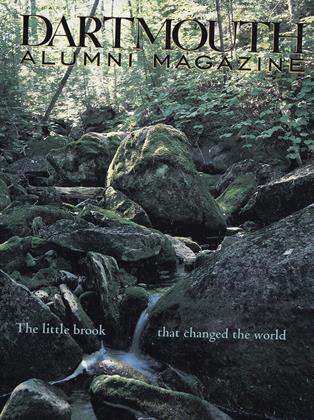In October, less than a month after announcing he would step down as Dartmouth's 15th president, James O. Freedman stepped up to a lectern at a
weekly luncheon of the National Press Club in Washington. Addressing a national radio audience and bathed in bright light for the C-SPAN television cameras, Freedman spoke on the role of the intellectual in modern society.
A summary of his accomplishments at Dartmouth had been made available to the journalists gathered at the luncheon though that hardly seemed necessary. Beginning with the head table, the gathering seemed an almost-exclusively Dartmouth event. Emcee David Martin'54 made the introductions: "Aaron Epstein, Knight-Ridder News Service and a Dartmouth graduate..." "Mark Willin, senior editor at Bloomberg News and a Dartmouth graduate..." "Jack Cushman, environmental reporter for The New YorkTimes and a Dartmouth graduate..." "The Honorable judd Gregg, Republican senator from New Hampshire and a Dartmouth parent..."
Mort Kondracke, '60, editor of The Roll Call, was there; nearby sat Trustee Susan Dentzer '77 of U.S. News ifWorld Report and Jennifer Avellino '89 of CNN. We recognized former Trustee Michael Heyman '51, Sarah Jackson-Han '88 of the Agence Francc-Presse. At our own table sat Viva Hardigg '84 of the Washington Post and her classmate, attorney Allen Waxman, one of the D.C.-area alums who had gotten word that the president was in town.
Freedman began his remarks with a paradox. "Although Americans talk endlessly about the importance of higher education, " he said, "in fact we undervalue the role of intellectuals. " He defined his terms early: "A definition that I particularly like is that ofVaclav Havel. An intellectual, he writes, 'is a person who has devoted his or her life to thinking in general terms about the affairs of this world and the broader context of thingsFor the next hour, Freedman spoke about the broader context of things in America, describing how the work of four intellectuals- Gunnar Myrdal ,John Kenneth Galbraith, Oscar Handlin, and David Reisman—shaped our national policy and debate on the subjects of race, economic priorities, immigration, and the tension between self and society.
The appearance gave a hint of Freedman's lecture style, which he'll employ as a member of the Dartmouth faculty after he retires as president in june of 1998—and showed that he'll have no problem thinking on his feet in front of students.
During the Q & A session following his speech, he was asked ifhe knew when Dartmouth will finally let Columbia win a football game. Freedman stepped immediately to the mike and in his measured, deliberate way, said, "Yes. We have that on our schedule for the year 2020."
 View Full Issue
View Full Issue
More From This Issue
-
 Cover Story
Cover StoryThe Little Brook That Changed the World
January 1998 By David Dobbs -
 Feature
FeatureAfter the FALL
January 1998 By Regina Barreca '79 -
 Feature
FeatureDweck & Ivey's Good Offense
January 1998 By LINDA TITLAR -
 Article
ArticleMedieval Road Trips
January 1998 By Kathleen Burge '89 -
 Article
ArticleGifts of the Season
January 1998 By "E. Wheelock" -
 Article
ArticleLibraries Unbound
January 1998 By James O. Freedman
Jim Collins '84
-
 Cover Story
Cover StoryMENTOR
NOVEMBER 1991 By Jim Collins '84 -
 Feature
FeatureFloating Home
June 1992 By Jim Collins '84 -
 Feature
FeatureOn The Water
Jul/Aug 2004 By JIM COLLINS '84 -
 Cover Story
Cover StoryANDREW WEIBRECHT '09
JANUARY | FEBRUARY 2014 By JIM COLLINS '84 -
 FEATURES
FEATURESA Monk’s Journey
JANUARY | FEBRUARY 2024 By JIM COLLINS '84 -
 Article
ArticleA Few Of Dartmouth's Adventure Pros
APRIL 1990 By Jim Collins '84, Andrew 's mother, Ed
Article
-
 Article
ArticleGIFT BY REV. J. E.JOHNSON IN MEMORY OF MELVIN O. ADAMS '71
December 1920 -
 Article
ArticleA Japanese-American Symposium
NOVEMBER 1962 -
 Article
ArticleCleveland Jaycees Honor Lee A. Chilcote Jr. '64
February 1975 -
 Article
ArticleGreen Light for Black Studies
June 1979 -
 Article
ArticleSummer speakers examine 20th-century life
OCTOBER • 1986 -
 Article
ArticleThe Battle of the Non-Teachers
FEBRUARY 1965 By M. DANIEL SMITH '46

